论语英语翻译
论语英文介绍带翻译
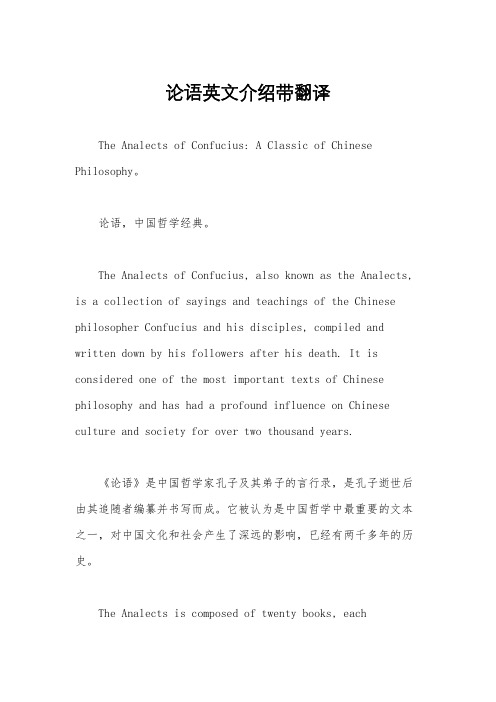
论语英文介绍带翻译The Analects of Confucius: A Classic of Chinese Philosophy。
论语,中国哲学经典。
The Analects of Confucius, also known as the Analects, is a collection of sayings and teachings of the Chinese philosopher Confucius and his disciples, compiled and written down by his followers after his death. It is considered one of the most important texts of Chinese philosophy and has had a profound influence on Chinese culture and society for over two thousand years.《论语》是中国哲学家孔子及其弟子的言行录,是孔子逝世后由其追随者编纂并书写而成。
它被认为是中国哲学中最重要的文本之一,对中国文化和社会产生了深远的影响,已经有两千多年的历史。
The Analects is composed of twenty books, eachcontaining a collection of sayings and teachings of Confucius and his disciples. The topics covered in the Analects include ethics, education, politics, and social relationships. The text emphasizes the importance of personal morality and the cultivation of virtues such as benevolence, righteousness, and wisdom. It also stressesthe importance of filial piety and respect for authority.《论语》由二十篇书组成,每篇书都包含了孔子及其弟子的言行录。
《论语》十则英文翻译

《论语》十则英文翻译子曰:“学而时习之,不亦说乎有朋自远方来,不亦乐乎人不知而不愠,不亦君子乎”The Master said, To learn and at due times to repeat what one has learnt, is that not after all a pleasure That friends should come to one from afar, is this not after all delightful To remain unsoured even though one’s merits are unrecognized by others, is that not after all what is expected of a gentleman?曾子曰:“吾日三省吾身:为人谋而不忠乎与朋友交而不信乎传不习乎”Master Tseng said, Every day I examine myself on these three points: in acting on behalf of others, have I always been loyal to their interests In intercourse with my friends, have I always been true to my word Have I failed to repeat the preceptsthat have been handed down to me?有子曰:“礼之用,和为贵。
先王之道,斯为美,小大由之。
有所不行,知和而和,不以礼节之,亦不可行也。
Master Yu said, In the usages of ritual it is harmony that is prized; the Way of the Former Kings from this got its beauty. Both small matters and great depend upon it. If things go amiss, he who knows the harmony will be able to attune them. But if harmony itself is not modulated by ritual, things will still go amiss.子曰:“吾十有五而志于学,三十而立,四十而不惑,五十而知天命,六十而耳顺,七十而从心所欲,不逾矩。
论语经典语录英语翻译(范文)
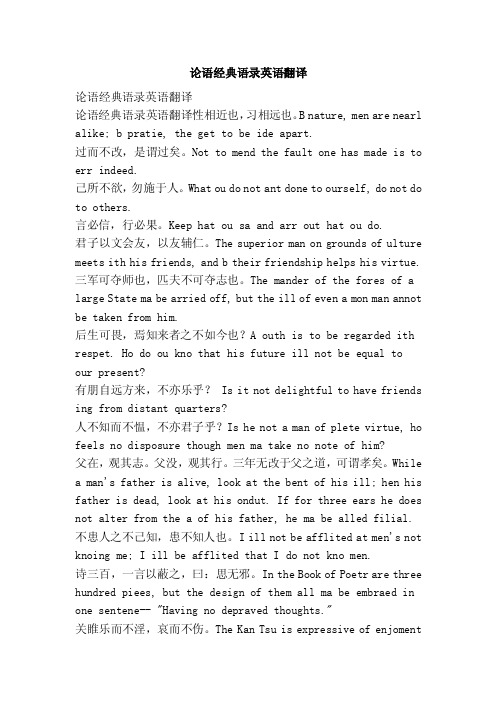
论语经典语录英语翻译论语经典语录英语翻译论语经典语录英语翻译性相近也,习相远也。
B natur e, men a re nearl alike;b pratie, the ge t to beide apar t.过而不改,是谓过矣。
Not to mend the fau lt one h as madeis to er r indeed.己所不欲,勿施于人。
What ou do n ot ant d one to o urself,do not d o to oth ers.言必信,行必果。
Kee p hat ou sa andarr outhat ou d o.君子以文会友,以友辅仁。
T he super ior manon groun ds of ul ture mee ts ith h is frien ds, andb theirfriendsh ip helps his vir tue. 三军可夺师也,匹夫不可夺志也。
Themander o f the fo res of a large S tate mabe arrie d off, b ut the i ll of ev en a mon man ann ot be ta ken from him.后生可畏,焉知来者之不如今也?A o uth is t o be reg arded it h respet. Ho doou kno t hat hisfuture i ll not b e equalto our p resent?有朋自远方来,不亦乐乎? Isit not d elightfu l to hav e friend s ing fr om dista nt quart ers?人不知而不愠,不亦君子乎?Is henot a ma n of ple te virtu e, ho fe els no d isposure thoughmen ma t ake no n ote of h im?父在,观其志。
2019年专业英语四级翻译模拟试题及答案:《论语》

2019年专业英语四级翻译模拟试题及答案:《论语》请将下面这段话翻译成英文:《论语》《论语》(The Analects of Confucius)是儒家的经典著作之一,它是对孔子及其弟子(disciple )的言行和对话的记录。
众所周知,孔子是一位伟大的思想家和哲学家,他的思想被发展成了儒家哲学体系。
《论语》是儒家思想的代表作,数个世纪以来,《论语》一直极大地影响着中国人的哲学观和道德观,它也影响着其他亚洲国家人民的哲学观和道德观。
参考翻译:The Analects of ConfuciusThe Analects of Confucius is one of the Confucius classics and is a record of the words and acts of Confucius and his disciples, as well as the conversations they held. It's well-known that Confucius is a great ideologist and philosopher, and his thoughts have been developed into a system of philosophy known as Confucianism. The Analects of Confucius is a representative work of Confucianism. For centuries, it has been heavily influencing the philosophy and moral outlook of Chinese people and that of the people of other Asian countries as well.1.经典著作:翻译为classics即可,简单明了。
文言文英语翻译经典句子
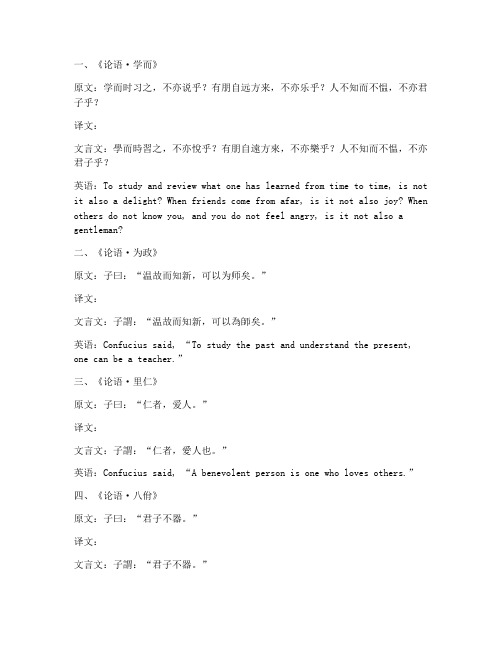
一、《论语·学而》原文:学而时习之,不亦说乎?有朋自远方来,不亦乐乎?人不知而不愠,不亦君子乎?译文:文言文:學而時習之,不亦悅乎?有朋自遠方來,不亦樂乎?人不知而不愠,不亦君子乎?英语:To study and review what one has learned from time to time, is not it also a delight? When friends come from afar, is it not also joy? When others do not know you, and you do not feel angry, is it not also a gentleman?二、《论语·为政》原文:子曰:“温故而知新,可以为师矣。
”译文:文言文:子謂:“温故而知新,可以為師矣。
”英语:Confucius said, “To study the past and understand the present, one can be a teacher.”三、《论语·里仁》原文:子曰:“仁者,爱人。
”译文:文言文:子謂:“仁者,愛人也。
”英语:Confucius said, “A benevolent person is one who loves others.”四、《论语·八佾》原文:子曰:“君子不器。
”译文:文言文:子謂:“君子不器。
”英语:Confucius said, “A gentleman is not a tool.”五、《论语·述而》原文:子曰:“三人行,必有我师焉。
择其善者而从之,其不善者而改之。
”译文:文言文:子謂:“三人行,必有我師焉。
選其善者而從之,其不善者而改之。
”英语:Confucius said, “Among three people walking together, there must be someone I can learn from. I will follow the good ones and correct the bad ones.”六、《论语·泰伯》原文:曾子曰:“君子以文会友,以友辅仁。
古语名句文言文英语翻译

一、《论语·学而》原文:学而时习之,不亦说乎?有朋自远方来,不亦乐乎?人不知而不愠,不亦君子乎?翻译:To study and review what one has learned at the proper time, is not this a joy? To have friends coming from afar, is not this a delight? To be unoffended when others do not understand you, is not this the attribute of a gentleman?二、《论语·为政》原文:子曰:“政者,正也。
子帅以正,孰敢不正?”翻译:Confucius said, “The essence of politics is righteousness. If you lead with righteousness, who dares to be unrighteous?”三、《论语·八佾》原文:子曰:“八佾舞于庭,是可忍也,孰不可忍也?”翻译:Confucius said, “If the danc e of the eight-line formation can be tolerated in the courtyard, what cannot be tolerated?”四、《论语·里仁》原文:子曰:“富而可求也,虽执鞭之士,吾亦为之。
如不可求,从吾所好。
”翻译:Confucius said, “If wealth can be sought, even if one has to be a chariot driver, I would do it. If not, I will follow my own inclinations.”五、《论语·述而》原文:子曰:“三人行,必有我师焉。
论语英语翻译

论仁On Humanity克己复礼为仁颜渊问仁。
子曰:“克己复礼为仁。
一日克己复礼,天下归仁焉。
为仁由己,而由人乎哉?”颜渊曰:“请问其目。
”子曰:“非礼勿视,非礼勿听,非礼勿言,非礼勿动。
”颜渊曰:“回虽不敏,请事斯语矣。
”白话翻译颜渊问什么是仁。
孔子说:“约束自己,并实行礼节,便是仁。
一旦能做到这一点,天下一切都可以容纳于一颗仁爱之心中。
实行仁全靠自己,哪能依靠别人呢?”颜渊问:“请问有哪些要点?”孔子说:“不符合礼便不看,不符合礼便不听,不符合礼便不说,不符合礼便不做。
”颜渊说:“我虽然笨拙,请允许我照先生的话去努力吧。
”The Meaning of HumanityYan Yuan asked about humanity. Confucius said:” humanity means to restrain oneself and observe the rites. Once one does this, the whole world would be embraced in one’s humane mind. To practice humanity depends on oneself---how can it depend on anyone else?” Yan Yuan said:” may I ask about the specific rules?” Confucius said:” one should not look if it does not conform to the rites; one should not listen if it does not conform to the rites; one should not speak if it does not conform to the rites, and one should not act if it does not conform to the rites.” Yan Yuan said:” although I am not bright, please allow me to behave according to your instruction.”己欲立而立人子贡曰:“如有博施于民而能济众,何如?可谓仁乎?”子曰:“何事于仁?必也圣乎!尧、舜其犹病诸!夫仁者,己欲立而立人,己欲达而达人。
《论语》12篇章原文+翻译
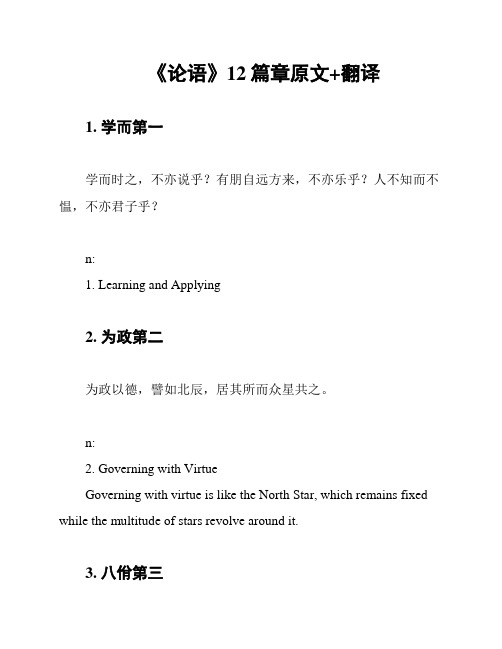
《论语》12篇章原文+翻译1. 学而第一学而时之,不亦说乎?有朋自远方来,不亦乐乎?人不知而不愠,不亦君子乎?n:1. Learning and Applying2. 为政第二为政以德,譬如北辰,居其所而众星共之。
n:2. Governing with VirtueGoverning with virtue is like the North Star, which remains fixed while the multitude of stars revolve around it.3. 八佾第三子曰:“八佾舞于庭,是可忍也,孰不可忍也?”n:3. The Eight DancesConfucius said, "___. But who is not tolerable?"4. 里仁第四子曰:“里仁为美。
择不处仁,焉得知?”n:4. ___ FamilyConfucius said, "Being kind within the family is beautiful. If one is unable to choose kindness, how can one understand it?"5. 公冶长第五子谓公冶长:“可妻也,虽在距之千里,可求也;可与也,虽在距之千里,可迎也。
”n:5. Gongye Chang6. 雍也第六子曰:“雍也可使南面。
”n:6. Yong YeConfucius said, "Yong Ye could be appointed as the one who ___."7. 颜渊第七子曰:“颜渊,季路可使南行。
”子路曰:“治!如之何?”子曰:“可与言而不可与行也。
”子路由此度名。
n:7. Yan YuanConfucius said, "Yan Yuan and Ji Lu could be ___ state." Zi Lu said, "If they were to be appointed, what should be done next?" Confucius said, "They can be taught what should be said, but not what should be done." After this, Zi Lu evaluated people according to their words.8. 季氏第八季氏将伐颛臾,冉有、季路见于孔子曰:“季氏将有事于颛臾。
《论语》选段翻译(中英文对照)
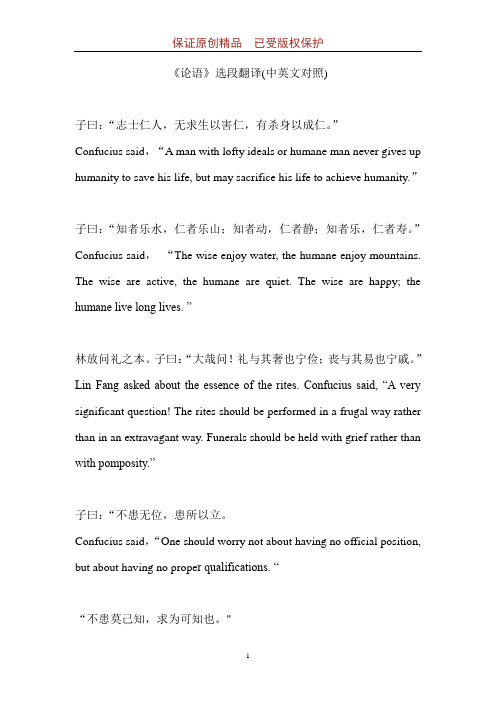
《论语》选段翻译(中英文对照)子曰:“志士仁人,无求生以害仁,有杀身以成仁。
”Confucius said,“A man with lofty ideals or humane man never gives up humanity to save his life, but may sacrifice his life to achieve humanity.”子曰:“知者乐水,仁者乐山;知者动,仁者静;知者乐,仁者寿。
”Confucius said,“The wise enjoy water, the humane enjoy mountains. The wise are active, the humane are quiet. The wise are happy; the humane live long lives. ”林放问礼之本。
子曰:“大哉问!礼与其奢也宁俭;丧与其易也宁戚。
”Lin Fang asked about the essence of the rites. Confucius said, “A very significant question! The rites should be performed in a frugal way rather than in an extravagant way. Funerals should be held with grief rather than with pomposity.”子曰:“不患无位,患所以立。
Confucius said,“One should worry not about having no official position, but about having no prope r qualifications. ““不患莫己知,求为可知也。
"”One should not seek to be known to others, but seek to acquire the qualities worthy of being known.”子曰:“人无远虑,必有近忧。
英语四级翻译题:论语.doc

2019年6月英语四级翻译题:论语请将下面这段话翻译成英文:《论语》(The Analects of Confucius)是儒家的经典著作之一,它是对孔子及其弟子(disciple )的言行和对话的记录。
众所周知,孔子是一位伟大的思想家和哲学家,他的思想被发展成了儒家哲学体系。
《论语》是儒家思想的代表作,数个世纪以来,《论语》一直极大地影响着中国人的哲学观和道德观,它也影响着其他亚洲国家人民的哲学观和道德观。
参考译文The Analects of ConfuciusThe Analects of Confucius is one of the Confucius classics and is a record of the words and actsof Confucius and his disciples, as well as the conversations they held. It’s well-known thatConfucius is a great ideologist and philosopher, and his thoughts have been developed into asystem of philosophy known as Confucianism. The Analects of Confucius is a representativework of Confucianism. For centuries, it has been heavily influencing the philosophy and moraloutlook of Chinese people and that of the people of other Asian countries as well.解析:1.经典著作:翻译为classics即可,简单明了。
2.儒家哲学体系:可直译为Confucian philosophy system 或者asystem of philosophy known asConfucianism,只是需要注意表意完整。
论语英文翻译
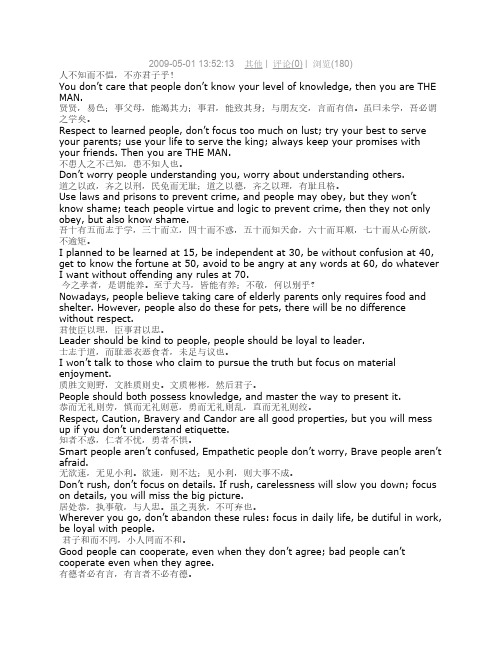
2009-05-01 13:52:13 其他 | 评论(0) | 浏览(180)人不知而不愠,不亦君子乎!You don’t care that people don’t know your level of knowledge, then you are THE MAN.贤贤,易色;事父母,能竭其力;事君,能致其身;与朋友交,言而有信。
虽曰未学,吾必谓之学矣。
Respect to learned people, don’t focus too much on lust; try your best to serve your parents; use your life to serve the king; always keep your promises with your friends. Then you are THE MAN.不患人之不己知,患不知人也。
Don’t worry people understanding you, worry about understanding others.道之以政,齐之以刑,民免而无耻;道之以德,齐之以理,有耻且格。
Use laws and prisons to prevent crime, and people may obey, but they won’t know shame; teach people virtue and logic to prevent crime, then they not only obey, but also know shame.吾十有五而志于学,三十而立,四十而不惑,五十而知天命,六十而耳顺,七十而从心所欲,不逾矩。
I planned to be learned at 15, be independent at 30, be without confusion at 40, get to know the fortune at 50, avoid to be angry at any words at 60, do whatever I want without offending any rules at 70.今之孝者,是谓能养。
论语的经典英文翻译精品

1.温故而知新,可以为师矣。
If a man keeps cherishing his old knowledge, so as continually to be acquiringnew, he may be a teacher of others.2.学而不思则罔,思而不学则殆。
Learning without thought is labour lost; thought without learning isperilous. 3.敏而好学,不耻下问。
He was of an active nature and yet fond of learning, and he was not ashamed to askand learn of his inferiors.4.知之者,不如好之者,好之者,不如乐之者。
They who know the truth are not equal to those who loveit, and they who love it are not equal to those who delight in it.5.默而识之,学而不厌,诲人不倦,何有于我哉。
The silent treasuring up of knowledge; learning withoutsatiety; and instructing others without being wearied -- which one of these things belongs to me? 6.三人行,必有我师焉。
择其善者而从之,其不善者而改之。
When I walk along with two others, theymay serve me as my teachers. I will select their good qualities and follow them, their bad qualities and avoidthem. 7.子曰:“知之者不如好之者,好之者不如乐之者。
论语及翻译

1.子曰:“学而时习之,不亦说乎?有朋自远方来,不亦乐乎?人不知而不愠,不亦君子乎?”The Master said, "Is it not pleasant to learn with a constant perseverance and application?Is it not delightful to have friends coming from distant quarters?Is he not a man of complete virtue, who feels no discomposure though men may take no note of him?"2.子曰:“三军可夺帅也,匹夫不可夺志也。
”The Master said, "The commander of the forces of a large state may be carried off, b ut the will of even a common man cannot be taken from him."3.子曰:“吾十有五而志于学,三十而立,四十而不惑,五十而知天命,六十而耳顺,七十而从心所欲,不逾矩。
”The Master said, "At fifteen, I had my mind bent on learning.At thirty, I stood firm. At forty, I had no doubts.At fifty, I knew the decrees of Heaven.At sixty, my ear was an o bedient organ for the reception of truth.At seventy, I could follow what my heart desi red, without transgressing what was right."4.温故而知新,可以为师矣。
中国文化典籍英语翻译及赏析12:孔丘论语《论语》
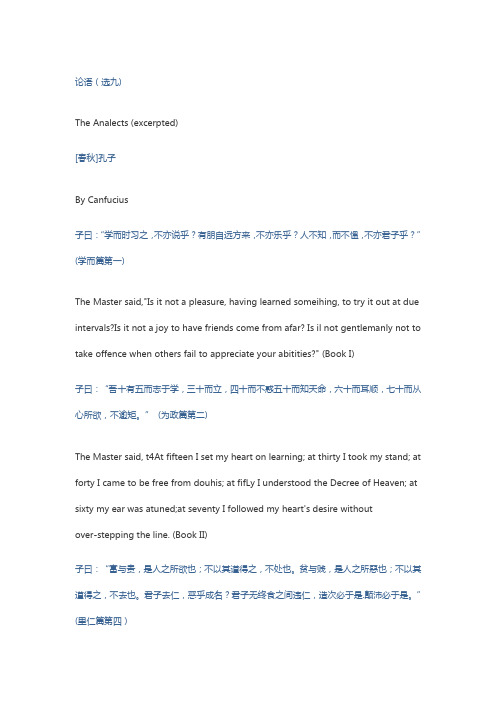
论语(选九)The Analects (excerpted)[春秋]孔子By Canfucius子曰:“学而时习之,不亦说乎?有朋自远方来,不亦乐乎?人不知,而不慍,不亦君子乎?”(学而篇第一)The Master said,"Is it not a pleasure, having learned someihing, to try it out at due intervals?Is it not a joy to have friends come from afar? Is il not gentlemanly not to take offence when others fail to appreciate your abitities?" (Book I)子曰:“吾十有五而志于学,三十而立,四十而不惑五十而知天命,六十而耳顺,七十而从心所欲,不逾矩。
”(为政篇第二)The Master said, t4At fifteen I set my heart on learning; at thirty I took my stand; at forty I came to be free from douhis; at fifLy I understood the Decree of Heaven; at sixty my ear was atuned;at seventy I followed my heart's desire withoutover-stepping the line. (Book II)子曰:“富与贵,是人之所欲也;不以其道得之,不处也。
贫与贱,是人之所惡也;不以其道得之,不去也。
君子去仁,恶乎成名?君子无终食之间违仁,造次必于是.颠沛必于是。
”(里仁篇第四)The Master said, “WeaJth and high station are whai men desire hut unless [ got them in the right way I could not remain in them. Poverty and low station are what men dislike, but even if I did not get them in the right way I would noi try to escape frum them."If the gentleman forsakes benevolence, in what way tan he make a name for himself? The gentleman never deserts benevolence, not even for as long us it takes to eat a meal.If he hurries and stumbles one muy be sure that it is in benevolence that he does so."(Book IV)叶公问孔子于子路,子路不对,子曰:“女奚不曰,其为人也,发愤忘食,乐以忘忧,不知老之将至云尔。
《论语》中英文对照版

《论语》中英文对照版敏而好学,不耻下问。
He was of an active nature and yet fond of learning, and he was not ashamed to ask and learn of his inferiors.十室之邑,必有忠信,如丘者焉,不如丘之好学也。
In a hamlet of ten families, there may be found one honourable and sincere as I am, but not so fond of learning.知之者,不如好之者,好之者,不如乐之者。
They who know the truth are not equal to those who love it, and they who love it are not equal to those who delight in it.学如不及,犹恐失之。
Learn as if you could not reach your object, and were always fearing also lest you should lose it.『⒈3』子曰:“巧言令色,鲜矣仁!”The Master said, "Fine words and an insinuating appearance are seldom associated with true virtue."『⒈6』子曰:“弟子,入则孝,出则弟,谨而信,凡爱众,而亲仁。
行有余力,则以学文。
”The Master said, "A youth, when at home, should be filial, and, abroad, respectful to his elders. He should be earnest and truthful. He should overflow in love to all, and cultivate the friendship of the good. When he has time and opportunity, after the performance of these things, he should employ them in polite studies."『⒈7』子夏曰:“贤贤易色;事父母,能竭其力;事君,能致其身;于朋友交,言而有信。
论语原文及翻译
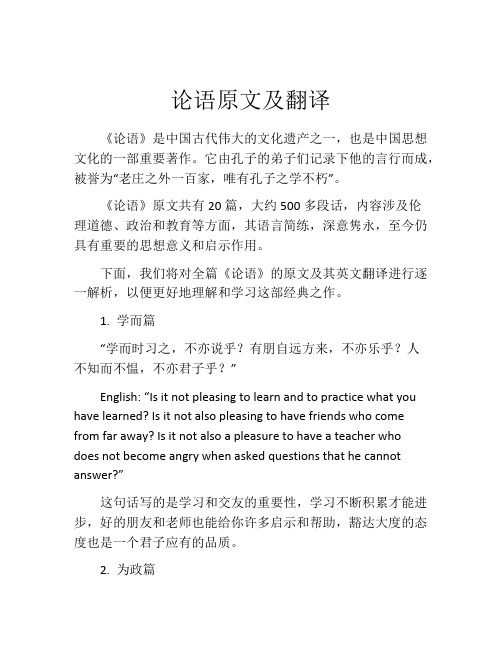
论语原文及翻译《论语》是中国古代伟大的文化遗产之一,也是中国思想文化的一部重要著作。
它由孔子的弟子们记录下他的言行而成,被誉为“老庄之外一百家,唯有孔子之学不朽”。
《论语》原文共有20篇,大约500多段话,内容涉及伦理道德、政治和教育等方面,其语言简练,深意隽永,至今仍具有重要的思想意义和启示作用。
下面,我们将对全篇《论语》的原文及其英文翻译进行逐一解析,以便更好地理解和学习这部经典之作。
1. 学而篇“学而时习之,不亦说乎?有朋自远方来,不亦乐乎?人不知而不愠,不亦君子乎?”English: “Is it not pleasing to learn and to practice what you have learned? Is it not also pleasing to have friends who come from far away? Is it not also a pleasure to have a teacher who does not become angry when asked questions that he cannot answer?”这句话写的是学习和交友的重要性,学习不断积累才能进步,好的朋友和老师也能给你许多启示和帮助,豁达大度的态度也是一个君子应有的品质。
2. 为政篇“见贤思齐焉,见不贤而内自省也。
”English: “When you see someone who is virtuous, think of becoming like her. When you see someone who is not virtuous, examine yourself within.”在治理国家的事务中,要学会尊重和借鉴他人的优点,同时更要反思自己存在的不足和错误。
这也是一种成长的方式,为政者只有不断完善自己,才能更好地执政。
3. 八佾篇“君子坦荡荡,小人长戚戚。
论语的经典英文翻译

1.温故而知新,可以为师矣。
If a man keeps cherishing his old knowledge, so as continually to be acquiringnew, he may be a teacher of others.2.学而不思则罔,思而不学则殆。
Learning without thought is labour lost; thought without learning isperilous. 3.敏而好学,不耻下问。
He was of an active nature and yet fond of learning, and he was not ashamed to askand learn of his inferiors.4.知之者,不如好之者,好之者,不如乐之者。
They who know the truth are not equal to those who loveit, and they who love it are not equal to those who delight in it.5.默而识之,学而不厌,诲人不倦,何有于我哉。
The silent treasuring up of knowledge; learning withoutsatiety; and instructing others without being wearied -- which one of these things belongs to me? 6.三人行,必有我师焉。
择其善者而从之,其不善者而改之。
When I walk along with two others, theymay serve me as my teachers. I will select their good qualities and follow them, their bad qualities and avoidthem. 7.子曰:“知之者不如好之者,好之者不如乐之者。
论语十则英文翻译
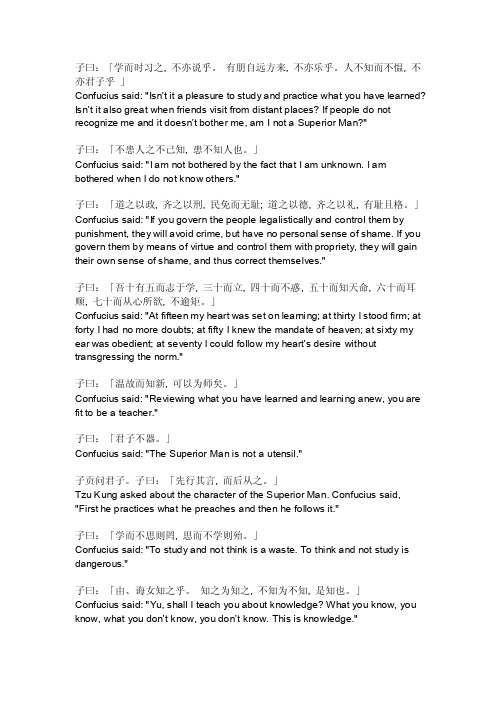
子曰:「学而时习之, 不亦说乎。
有朋自远方来, 不亦乐乎。
人不知而不愠, 不亦君子乎」Confucius said: "Isn’t it a pleasure to study and practice what you have learned? Isn’t it also great when friends visit from distant places? If people do not recognize me and it doesn’t bother me, am I not a Superior Man?"子曰:「不患人之不己知, 患不知人也。
」Confucius said: "I am not bothered by the fact that I am unknown. I am bothered when I do not know others."子曰:「道之以政, 齐之以刑, 民免而无耻; 道之以德, 齐之以礼, 有耻且格。
」Confucius said: "If you govern the people legalistically and control them by punishment, they will avoid crime, but have no personal sense of shame. If you govern them by means of virtue and control them with propriety, they will gain their own sense of shame, and thus correct themselves."子曰:「吾十有五而志于学, 三十而立, 四十而不惑, 五十而知天命, 六十而耳顺, 七十而从心所欲, 不逾矩。
」Confucius said: "At fifteen my heart was set on learning; at thirty I stood firm; at forty I had no more doubts; at fifty I knew the mandate of heaven; at sixty my ear was obedient; at seventy I could follow my heart’s desire without transgressing the norm."子曰:「温故而知新, 可以为师矣。
- 1、下载文档前请自行甄别文档内容的完整性,平台不提供额外的编辑、内容补充、找答案等附加服务。
- 2、"仅部分预览"的文档,不可在线预览部分如存在完整性等问题,可反馈申请退款(可完整预览的文档不适用该条件!)。
- 3、如文档侵犯您的权益,请联系客服反馈,我们会尽快为您处理(人工客服工作时间:9:00-18:30)。
1.子曰:“學而時習之,不亦說乎?有朋自遠方來,不亦樂乎?人不知而不慍,不亦君子乎?”The Master said, "Is it not pleasant to learn with a constant perseverance and application?"Is it not delightful to have friends coming from distant quarters? "Is he not a man of complete virtue, who feels no discomposure though men may take no note of him?"2.子曰:“巧言令色,鮮矣仁。
”Fair appearances are suspicious. The Master said, "Fine words and an insinuating(谄媚的,讨好的) appearance are seldom associated with true virtue."3.曾子曰:“吾日三省吾身:爲人謀而不忠乎?與朋友交而不信乎?傳不習乎?”How the philosopher Tsang daily examined himself, to guard against his being guilty of any imposition. The philosopher Tsang said, "I daily examine myself on three points:-- whether, in transacting business for others, I may have been not faithful;-- whether, in intercourse with friends, I may have been not sincere;-- whether I may have not mastered and practiced the instructions of my teacher."4.子曰:“不患人之不己知,患不知人也。
”Personal attainment should be our chief aim. The Master said, "I will not be afflicted at men's not knowing me; I will be afflicted that I do not know men.5.子曰:“《詩》三百,一言以蔽之,曰‘思無邪’。
”The pure design of the Book of Poetry. The Master said, "In the Book of Poetry are three hundred pieces, but the design of them all may be embraced in one sentence -- 'Having no depraved thoughts.'"6.子曰:“吾十有五而志於學,三十而立,四十而不惑,五十而知天命,六十而耳順,七十而從心所欲,不踰矩。
”Confucius's own account of his gradual progress and attainments. The Master said, "At fifteen, I had my mind bent on learning."At thirty, I stood firm."At forty, I had no doubts."At fifty, I knew the decrees of Heaven."At sixty, my ear was an obedient organ for the reception of truth."At seventy, I could follow what my heart desired, without transgressing(违背,越界) what was right."7.子曰:“溫故而知新,可以爲師矣。
”To be able to teach others one must from his old stores be continually developing things new. The Master said, "If a man keeps cherishing his old knowledge, so as continually to be acquiring new, he may be a teacher of others."8.子曰:“君子不器。
”The general aptitude of the Chün-tsze. The Master said, "The accomplished scholar is not a utensil."9子貢問君子。
子曰:“先行其言而後從之。
”How with the superior man words follow actions. Tsze-kung asked what constituted the superior man. The Master said, "He acts before he speaks, and afterwards speaks according to his actions."10.子曰:“學而不思則罔,思而不學則殆。
”In learning, reading and thought must be combined. The Master said, "Learning without thought is labor lost; thought without learning is perilous."11.子曰:“由,誨女知之乎!知之爲知之,不知爲不知,是知也。
”There should be no pretense in the profession of knowledge, or the denial of ignorance.The Master said, "Yû, shall I teach you what knowledge is? When you know a thing, to hold that you know it; and when you do not know a thing, to allow that you do not know it;-- this is knowledge."12.子曰:“非其鬼而祭之,諂也。
見義不爲,無勇也。
”Neither in sacrifice nor in any other practice may a man do anything but what is right.. The Master said, "For a man to sacrifice to a spirit which does not belong to him is flattery.2. "To see what is right and not to do it is want of courage."13.孔子謂季氏:“八佾舞於庭,是可忍也,孰不可忍也?”Confucius's indignation at the usurpation of royal rites. Confucius said of the head of the Chî family, who had eight rows of pantomimes in his area, "If he can bear to do this, what may he not bear to do?"14.定公問:“君使臣,臣事君,如之何?”孔子對曰:“君使臣以禮,臣事君以忠。
”The guiding principles in the relation of prince and minister. The duke Ting asked how a prince should employ his ministers, and how ministers should serve their prince. Confucius replied, "A prince should employ his minister according to according to the rules of propriety; ministers should serve their prince with faithfulness."15.子曰:“朝聞道,夕死可矣!”The importance of knowing the right way. The Master said, "If a man in the morning hear the right way, he may die in the evening without regret."16.子曰:“見賢思齊焉,見不賢而內自省也。
”The lessons to be learned from observing men of different characters. The Master said, "When we see men of worth, we should think of equaling them; when we see men of a contrary character, we should turn inwards and examine ourselves."17.子曰:“父母在,不遠遊;遊必有方。
”A son not ought to go to a distance where he will not be able to pay the due services to his parents.The Master said, "While his parents are alive, the son may not go abroad to a distance. If he does go abroad, he must have a fixed place to which he goes." 18.子曰:“君子欲訥於言而敏於行。
